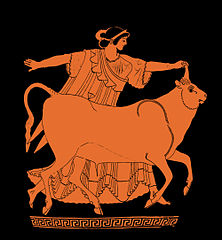
Stefaan Blancke, a postdoctoral researcher in the department of philosophy and moral sciences at Ghent University in Belgium, and the lead author of “Creationism in Europe: Facts, Gaps, and Prospects,” is here to answer a few questions about the article, as described in part 1.
How did you become interested in writing about creationism in Europe?
I became interested in creationism in Europe through my fascination with evolutionary theory and its enormous explanatory power, not just in regards to the biological world, but also in relation to human thought and behavior. The fact that there are people who are able to deny this, mostly for religious reasons, I find both perplexing and intriguing. Like many people in Europe, I knew about the creationist opposition in the United States. A series of incidents involving creationism or “intelligent design” in several European countries, however, clearly indicated that Europe too has its share of creationism and that European creationists have become more active. That is when we, my supervisor Johan Braeckman and I, decided to devote a study to it. Initially, we focused on the Low Countries, but soon, in collaboration with our Danish colleagues Peter C. Kjærgaard and Hans Henrik Hjermitslev and with the support of Ronald Numbers, the project expanded into a much broader study of creationism in Europe.
What were the most surprising results of your study?
Three things have struck me the most. First, it is generally acknowledged that creationism in Europe is not as big a phenomenon as in the United States. While this is certainly true, and great differences obtain from one European country to the next, I was nonetheless surprised by the ubiquity and popularity of European creationist activism. Second, and relating to the first observation, in some countries, such as Russia, creationism, sometimes through the power of the dominant church, has been able to exert serious societal and political influence. And third, I was impressed with the ease by which creationist beliefs adapt to particular environments, taking on any form and shape that might favor their cultural distribution. In Turkey, they mix with typical Muslim beliefs and fears about the allegedly degrading influence of the Western lifestyle. In Eastern Europe, they tap into fears about Communism and restrictions on freedom of thought. From developmental and cognitive psychology, we know that in general creationist beliefs appeal very strongly to the human mind, but these local allegiances and mutations appear to make such beliefs highly resilient.
Toward the end of your paper, you draw a threefold distinction between intuitive, local, and imported creationism. Can you explain the distinction and its importance?
The term “intuitive creationism” denotes creationist beliefs that people hold without articulating them. As these beliefs may form a natural part of their culture and tradition, people might not even be consciously aware of them or only have fuzzy notions of them—until, of course, a survey explicitly asks them about their beliefs, or they form the feeling that their beliefs are under threat by, for instance, the teaching of evolution. Intuitive creationism also forms the grassroots from which activist creationism, either local or imported, draws its support. Local creationism comprises creationist beliefs that originate and are maintained within the local religious tradition, whereas imported creationism has been introduced from a different cultural environment, usually the United States. These distinctions are indispensible as analytic tools to get a firm grip on the different types of creationism in Europe and on the ways in which they interact. If we were to treat creationism in Europe indiscriminately, many nuances and interesting developments would be overlooked. For instance, local creationist groups often do not appropriate American creationism wholesale but adopt particular arguments or strategies that they embed within their own religious context and employ to their own purposes. Sometimes these groups have fierce discussions among themselves about whether US-style creationism plays or should play a role in their tradition. You can only understand these kinds of processes if you distinguish between the types of creationism we suggested.
What’s the next step for your work examining creationism in Europe?
Well, as we mentioned in the paper, Hans Henrik Hjermitslev, Peter C. Kjærgaard, and I are currently finalizing an edited volume with the title The History of Creationism in Europe under the guidance of Ronald Numbers. The book will be published next year with the Johns Hopkins University Press in Baltimore and will be the first sustained historical study of modern creationism in Europe. It contains chapters on several European countries and regions as well as some topical chapters, all written by experts in the field. I am very much looking forward to seeing it published.
Other than your own work, of course, what books or articles on creationism in Europe would you recommend to the interested reader, and why?
In recent years, excellent papers and chapters have been published on creationism in Europe, sometimes in Reports of the NCSE, so it is difficult for me to make a selection. Those who are interested in the details should consult the bibliography in the paper. But if I was pressed to make a choice, I would go for the beautiful paper by Abraham C. Flipse, “The origins of creationism in the Netherlands: The evolution of the debate among twentieth-century Dutch neo-Calvinists,” published in Church History (2012;81(1):104–147), in which he traces the role of creationism in the debates among the Dutch Calvinists from the end of the nineteenth century till the 1970s. Another study that will always stick with me is “The growing visibility of creationism in Northern Ireland: Are new science teachers equipped to deal with the issues?” authored by Conor McCrory and Colette Murphy and published in Evolution: Education and Outreach (2009;2(3):372–385). They found that future science teachers were not immune to creationist arguments put forth in an “intelligent design” DVD, which is very unsettling.

